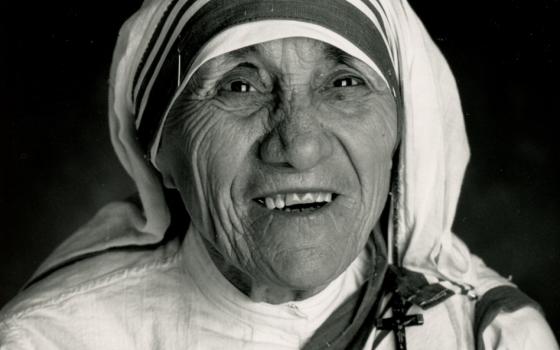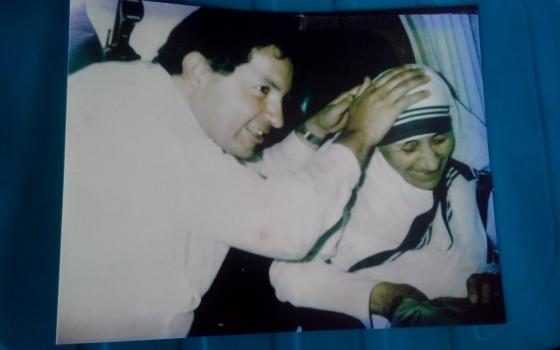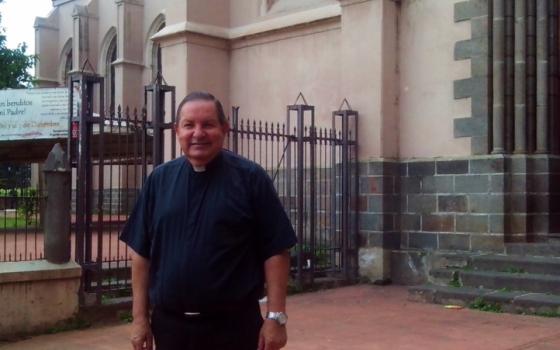Fr. Leonel Chacón, the parish priest of La Merced who brought Mother Teresa to Costa Rica in July of 1988, had a feeling upon meeting her that she was truly special, holy.
"There are many extraordinary people," he said, "but with the scent of sanctity, I’d say very few.”
He expanded by saying, "One feels one is facing a person, actually, with much of what is extraordinary, much of what transcends, as if, more than anything, someone is within her, in action.”
Mother Teresa's visit to this Central American nation, following a brief stay in Nicaragua, marked the arrival of her order in Costa Rica. Chacón recently spoke with Global Sisters Report at his church about his role in church history.
It all began as a humanitarian initiative Chacón launched in 1981 in Coronado, where four years earlier he had set out on his mission as a priest.
With a group of local people, he opened a home inside the rectory for ill elderly persons who were living in poverty, initially lodging 14 of them. He later moved them to a facility where sisters of Mother Teresa's Missionaries of Charity in Costa Rica now run a larger shelter.
Chacón recalls being moved to act "through sensitivity and the proclivity of a Christian who's beginning his ministry as a priest and very sensitive to human pain."
"We devoted ourselves to find a place to lodge those elderly persons," and "that's how we began to have them at the rectory," said the affable priest. "Later on, by the work and grace of the Holy Spirit, there appeared the place where, presently, the sisters today have the home" in Coronado.
In short order, they went beyond serving 14. "We'd come here, to downtown San José, to pick up the elderly who were sleeping on the streets and take them there," where they would receive not only food and medical care but "lots and lots of tenderness, and lots of love," he said.
A group of local sisters briefly joined the effort but were eventually transferred, and Chacón realized that, at some point in time, he also would have to fulfill his mission somewhere else. That led him to ask Monsignor Román Arrieta — then the archbishop of San José — to help him find a way to keep the home open and run by sisters,specifically, missionaries of Mother Teresa's congregation.
"A lot was heard about Mother Teresa, and I had also read about her, and one is awed to see so much charity work and so much world fame, not fame that seeks renown or title or power but to serve and show all the love," he said.
He proposed writing to Mother Teresa in the early '80s, "and that's how we got in touch," Chacón said. "She wrote to me and told me she was coming."
Mother Teresa initially sent Mother Premila from India in early 1986. But Premila stated outright that Mother Teresa's congregation could not possibly settle in Costa Rica because it was a rich country, referring to its above-average local standard of living in Central America.
"But they were indigents, they were people in a very, very bad situation, and [they were] elderly who had no one," the padre pointed out, adding that he again wrote to Mother Teresa, who sent another delegation in mid-1986.
This time it was headed by Sister Felícitas from Spain, he said, "and after that, the date for Mother Teresa's arrival was set."
When the day came, Chacón traveled to the airport in Nicaragua at 4 a.m. and flew back with Mother Teresa to Costa Rica.
"She stayed for a few days, and it was a marvelous experience," he said. "And after that, we continued to communicate, and [it was] very nice," he recalled, showing a photograph of himself and Mother Teresa on the flight to San José.
Regarding the connection he established with her, the priest said, "When one has contact with a person like her — actually chosen by God for such a noble mission — one knew that a person was there with certain charisms that aren't common . . . her expression, her way to have an answer for everything . . . like very special."
"I remember right there, at the chapel — we had a very pretty one in the home — I said to her: 'Sister, tell me one little thing. Here, I have 70 beds and 70 elderly persons that I'm transferring to you. And if more were to show up?'
"And she tells me: 'That's what the chapel benches are for. There is room for them here,'" Chacón remembered.
"So, that's when I felt more at ease, because I was in front of a person who could truly face up to the whole situation — which was strongly unsettling to me, and even more so to her," said the priest.
He continued contact with Mother Teresa while those in her order settled and "became stronger by the day."
Chacón confirmed that, "From the moment I met her, I knew she was going to be like a very holy woman. You could see that in her, right?"
Asked about his feeling about Mother Teresa's canonization, he replied, "I feel very happy, as any human being could feel, to see that he met a person who today is raised to the honor of the altar."
He recalled a similar sensation at the death of Sr. María Romero (1920-1977), a Nicaraguan who was sent in 1931 to Costa Rica, where for the following 46 years she devoted herself to the needy. She had trained Chacón in catechesis.
"Curiously, the day she died, the following day I was being ordained as a priest," he said. "She died in this world, for the things of the world, but I was born to continue the mission."
"I also knew Monsignor [Óscar] Arnulfo Romero, whom I also had very nice contact with," he further recalled. The archbishop of San Salvador, having taken a stand against military repression during the war in El Salvador, was gunned down in 1980 during Mass at a hospital.
"And so, God has given me the opportunity to share with such people, as well," he concluded.
[George Rodriguez, a freelance correspondent based in Costa Rica, has reported for Reuters and other international news agencies.]
Related - Missionaries of Charity in Costa Rica make poorest of the poor feel that God is present



